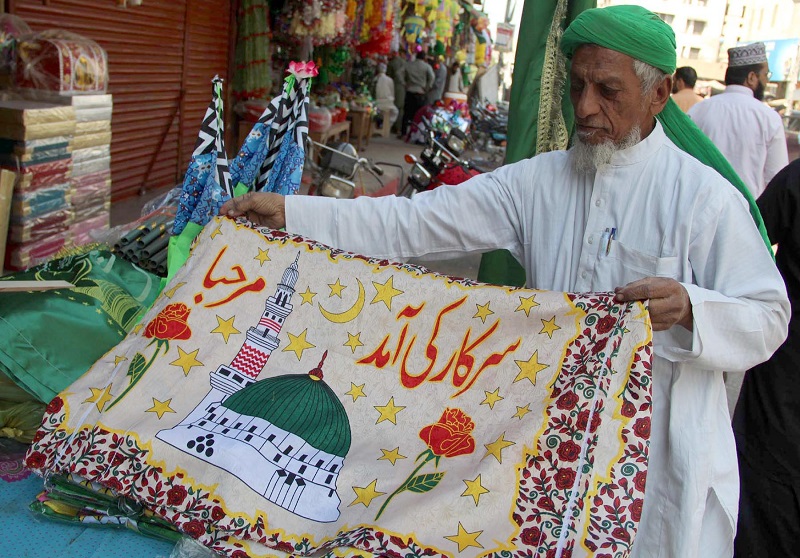By Samuel Bashir
Eid Milad-un-Nabi (PBUH) brings a message of joy and devotion to Muslims around the world. This day is not merely an occasion for celebrations and processions, but also a time to seek guidance from the life of the Prophet Muhammad (PBUH) and to reflect on our individual and collective lives.
The Holy Quran declares the Holy Prophet (PBUH) as “Rahmat-ul-‘Alamin”—a mercy not only for Muslims but for all humanity. The question is: to what extent do we, as a nation, follow the principles of Seerat-un-Nabi (Sallallahu Alaihi Wasallam) in our treatment of minorities?
The life of the Holy Prophet (PBUH) is full of examples of religious tolerance and the protection of minority rights. The Covenant of Medina was the world’s first written agreement guaranteeing the protection of life and property for both Muslims and Jews.
When the Christians of Najran came to Medina, the Prophet Muhammad (PBUH) allowed them to worship inside the Prophet’s Mosque. He (ﷺ) always honored his promises and established relations with non-Muslims based on justice and equality. The Rightly Guided Caliphs carried forward this tradition. When Jerusalem was conquered during the reign of Hazrat Umar (RA), he guaranteed the lives, property, and places of worship of Christians.
All these examples show that treating minorities with fairness and protecting their rights is a fundamental teaching of Islam.

The Constitution of Pakistan also guarantees religious freedom. According to Article 20 of the Constitution, every citizen has the right to practice their religion and worship freely. Quaid-e-Azam Muhammad Ali Jinnah clearly stated in his speech of August 11, 1947: “In Pakistan, you are all free to go to your temples, you are free to go to your mosques, or to any other place of worship. You may belong to any religion, caste, or creed—that has nothing to do with the business of the State.”
Unfortunately, the practical situation is quite the opposite. Minorities in Pakistan face numerous challenges:
• Forced conversions—particularly of underage girls in Sindh and South Punjab.
• Misuse of blasphemy laws—which today threaten not only minorities but also Muslims themselves; the so-called “Blasphemy Business Group” is one such example.
• Attacks on places of worship—churches and temples have repeatedly been targeted by mobs, with the Jaranwala incident being the most recent example.
• Socio-economic discrimination—minorities are often sidelined in employment, education, and political representation.
Such attitudes contradict both Islamic teachings and the Constitution of Pakistan, as well as the vision of Quaid-e-Azam.
There is a stark contradiction between the Seerat-un-Nabi (Sallallahu Alaihi Wasallam) and current Pakistani social attitudes. The Prophet (Sallallahu Alaihi Wasallam) treated even his fiercest opponents with justice and mercy, yet today we hesitate to recognize our non-Muslim compatriots as equal citizens.
This raises an important question: is the celebration of Eid Milad-un-Nabi (PBUH) limited to lighting lamps and reciting Naats, or do we also pledge to follow the Seerat-un-Nabi (Sallallahu Alaihi Wasallam) in our daily lives?
The true message of this day is that we should model our conduct after the Holy Prophet (PBUH). We must:
• Promote religious tolerance and mutual respect.
• Grant minorities their legitimate rights while upholding the Constitution of Pakistan.
• Ensure the social and legal protection of minority communities.
• Educate the younger generation about the aspects of the Seerat-un-Nabi (PBUH) that emphasize justice, equality, and human dignity.
Eid Milad-un-Nabi (PBUH) reminds us that the Prophet’s (PBUH) teachings are centered on justice, peace, and tolerance for all humanity. If Pakistan is to be built on the model of the life of Muhammad (PBUH), then ensuring justice and equality for minorities is the most basic condition. This is the demand of the Seerat-un-Nabi (PBUH) and the dream of Quaid-e-Azam for Pakistan.
Disclaimer:
The views and opinions expressed in this article/Opinion/Comment are those of the author and do not necessarily reflect the official policy or position of the DND Thought Center and Dispatch News Desk (DND). Assumptions made within the analysis are not reflective of the position of the DND Thought Center and Dispatch News Desk.
